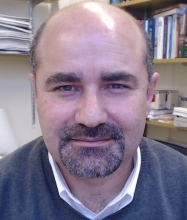
Department of Materials Engineering
Purdue University, West Lafayette, Indiana
Abstract: Understanding the strength of metals has been a scientific challenge for many decades. In recent years, much progress has been made toward understanding the plastic strength of metals, thanks to the method of dislocation dynamics simulations. This method proved to be powerful for understanding the mechanism of deformation at small strains (~ few %). Practical levels of crystal deformation encountered in experiments require the development of dislocation-based theories of plasticity that capture the deformation mechanisms over a much larger range of strain. The method of continuum dislocation dynamics is believed to meet this objective. The method casts the dislocations dynamics problem in the form of transport-reaction equations for crystal dislocations after expressing them in terms of density fields. At this point, however, the method faces theoretical challenges, including modeling of the dislocation reactions, collective dislocation mobility, short range interaction effects, and accounting for the finite deformation kinematics in its mathematical formulation. These problems will be discussed in this presentation, along with our progress in theoretical and computational methods. The power of continuum dislocation dynamics will be demonstrated by revealing the origin of dislocation cell structure formation in FCC crystals as well as the hardening behavior. The impact of the method on other metal science problems such as recrystallization, fatigue and facture will also be demonstrated by showing recent simulation results.
Bio: Anter El-Azab is a professor of materials science and engineering at Purdue University who focuses on microstructure science of materials. Prior to coming to Purdue, he held a full professor position at Florida State University in scientific computing and materials science and engineering. Prior to that, he spent six years as a research scientist with Pacific Northwest National Laboratory. El-Azab earned his doctoral degree at the University of California, Los Angeles. He is the founding editor and editor-in-chief of Materials Theory, a Springer-Nature journal that was recently launched. He was the chairman of the 4th International Conference on Multiscale Modeling of Materials (2008) and the Dislocations-2016 Conference (2016). He served as guest editor for Philosophical Magazine, Journal of Applied Physics, Modelling and Simulation in Materials Science and Engineering, and SIAM Journal of Multiscale Modeling. He is the author and co-author of over 130 journal and refereed conference papers and close to 10 special journal issues and proceedings volumes. El-Azab is most known for his work on mesoscale theory of metal deformation, microstructure evolution in materials, defect disorder in oxides and development of computational methods for materials and mechanics applications.
Share
Upcoming Events
-
MSE 298 Seminar: Mechano-Electrochemical Phenomena at Ceramic Electrolyte Interfaces
-
CBE 298 Seminar: Beyond the Tailpipe - From the Science of Soot Formation to the Engineering of Carbon Nanomaterials
-
MSE 298 Seminar: Innovation In Materials Science - An Industrial R&D Perspective
-
MSE 298 Seminar: Understanding the Impact of Grain Boundary Inclination on Grain Growth Using Modeling and Simulation and Experiments
-
EECS Seminar: Mixed Conductors for Bioelectronics
